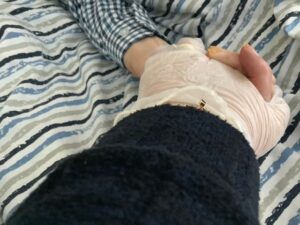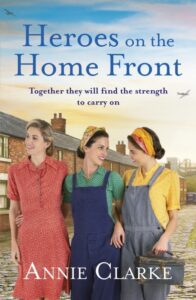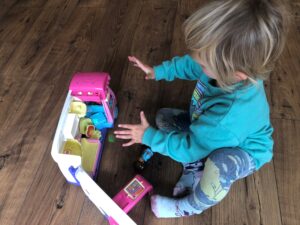I can hardly believe it is a year since Bob went into care. I have fought to have a meaningful visit for almost as long. I have three files of letters, have been interviewed on the main BBC news at 6 pm and 10 pm and done a double page spread with The Daily Express. I have joined 2 campaign groups and worked with human rights lawyers.
Still, I have only seen him in his room for the last five weeks for 30 minutes each time because I have begged and underlined the guidance – which I have kept up with regularly –and where it mentioned ‘ end of life’, which states meaningful visits should be facilitated safely (with lateral flow tests, temperature tests and PPE.) My GP has supported me, and my Admiral nurse. My GP wrote a letter stating she thought Bob had months to live. 6-12 months is deemed end of life. This should be recognised by care-homes. It is written in the guidance during COVID-19. That was November. It took till the end of January. There are thousands and thousands more families up and down the country suffering. Yes, many residents have died in care-homes from COVID-19 but I wonder how many have died because they have been isolated from loved ones and have given up? I have seen the mental anguish. I have gone every week I was allowed on site to see Bob at the window. I have witnessed the scratching at the window, the crying for me.
The deterioration in just a year is profound. Bob cannot stand, needs a hoist, has a soft diet as he has a high risk of choking, is doubly incontinent, and speaks in odd words and phrases which are often muddled or random. He is as dependent as a baby. But he’s mine, and he’s still inside there somewhere.
So Bob is a shell of the man that walked into care. He doesn’t know me. I can hold his hand but he has forgotten how to hold mine. All those weeks he reached out to me begging to hold my hands and now he’s forgotten how to. I tell him I’m Chris, his wife and I love him and it’s a good day because I’ve come to see him. I pick up one of the memory books I’ve done for him and I talk to him about the pictures.
‘ Look, this is a lovely picture darling. That’s Eddie with his arm around you. You were in Skegness having fish and chips’.
There is some recollection and then ‘ Edward, Edward, Edward!’
‘ Yes, and look who this is, it’s your Joey, yes, that’s Joseph’
Another flicker perhaps, a frown, dredging up the distant memory of his eldest son’s name.
And then, ‘ He’s a good chap.’
‘ Yes, he is. Dr Joe , he’s coming to see you tomorrow, darling, as soon as he’s finished at the hospital. He’s coming to see you. How wonderful will that be?’
He looks around his bedroom as though he might be coming right now.
Then he sees my smiling face on his pictures on the memories blanket on his bed.
‘ She’s smiling’, he says.
‘ Yes darling, that’s me and I’m smiling because I’m here with you’
‘You’re very pretty’
‘ And you’re my handsome Bob’
That has tickled him and he laughs and laughs.
It is magical to have this response. Sometimes it is nothing. Staring in front of him if he’s sat in a chair, or laying in bed with the radio blaring. Lost in his thoughts, days passing, monotony, lifeless and without my stimulation. He jerks and reaches for things in fresh air, hallucinating. Today is a calm day.
It’s amazing what I can pack in the 30 minutes. I take him chocolate buttons and he opens his mouth like a little bird and I pop them in, one at a time. He licks his lips and I know he’s enjoyed them. I read to him. The Owl and the Pussycat last time. I play him our tunes. The Beatles ‘Ooh Blah Dee Ooh Blah Da’ and he responds. He wails to the chorus, trying to sing. He recognises the chorus and I’m pleased I thought of that one. I dance around in front of him singing and trying to get a further response. I play ‘ A Groovy Kind of Love’ by Phil Collins. Our song. He knows the name. ‘ A long time ago’ he says.
It is – a lifetime away.
Out of the blue he says, ‘ I love you’ and I’m overcome, the tears spill. Happy tears tinged with sadness.
Then the knock at the door. ‘ Time’s Up’. I want to stay longer. He is just beginning to know me again, there’s a definite connection. Surely it makes no difference, I’m in his room, I’m not interfering with anyone. It’s not near tea time. Why can’t I stay two hours? He’s dying. Every minute is precious.
Knock knock. ‘Sorry it’s time’. It’s agony. I don’t want to go. I’ll have to wait another week. I’m in an emotional trauma. Do prisoners get longer?
I tell him I love him and always will. I tell him I’ll be back. I say ‘I’ll bring you chocolate.’ I kiss him with my mask on, on his forehead. He doesn’t respond. He goes back inside himself. My eyes are full of tears. How can this be happening? I should have the same status as the carers. I am the family carer. I know him and can love and stimulate him.
They see my tears. I can’t speak. I try to get out quickly. I ram the PPE in the bin, I wash my hands and I briskly walk to the car. I sit in the car, my head bowed. I cannot stop the sobs. I wait till I can drive the 15 minutes home. I’m numb. The next day is the same. I sometimes just cannot do anything. No motivation for the next day’s tasks. This lockdown and isolation does not help. I cannot wait to mix with friends again.
This is my routine now. I try to busy myself. I allow myself one day of grief after the visit, then I try to keep my mind and body busy. Walking and walking until I tire. School work prep. Box sets. Zoom meetings, Zoom teaching. This is the limbo land and routine I’m existing in at the moment. Until the next visit.















